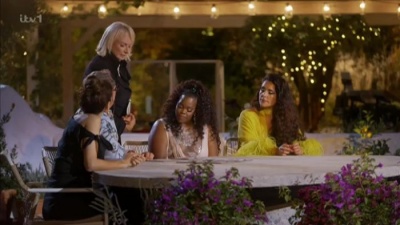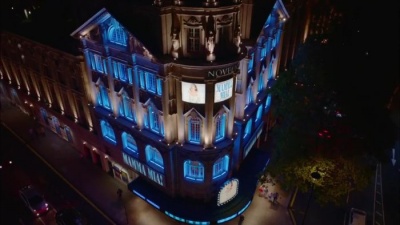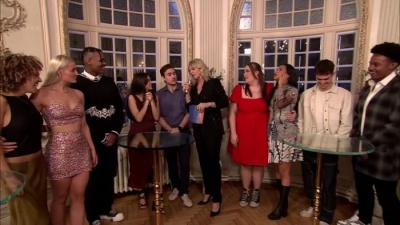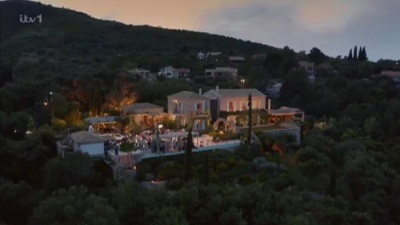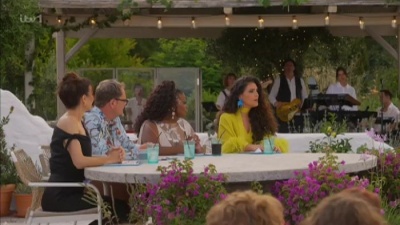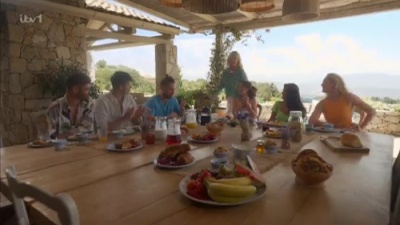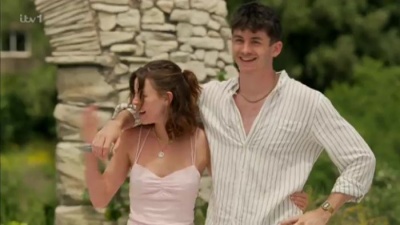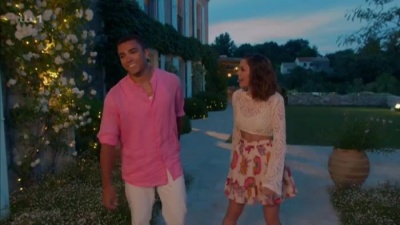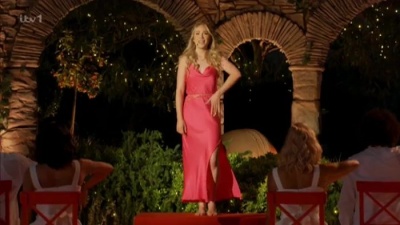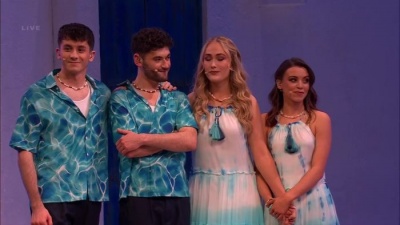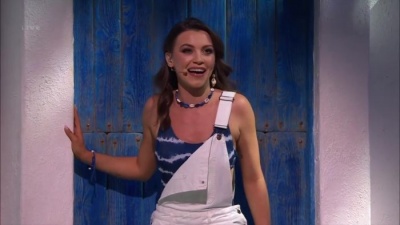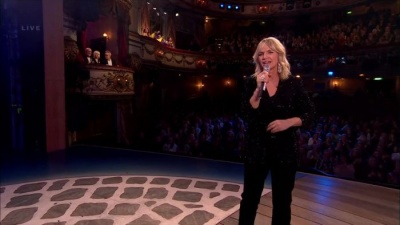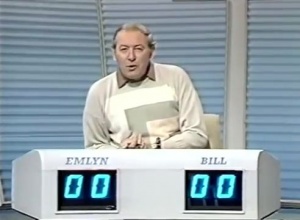Weaver's Week 2023-12-17
Last week | Weaver's Week Index | The Week of the Year 2023
Here we go again.
Contents |
Mamma Mia! I Have a Dream
Thames for ITV, 22 October – 16 December
Our story begins in the dim dark days of 1992, and the release of the album ABBA Gold. The CD reminded everyone that ABBA made a whole lot of chiffin' brilliant songs, covering the whole gamut of human emotion – elation, depression, revenge, reunion, and feeling like a pint-sized dictator who's been defeated in battle. (Bit of a niche emotion, that last one, but it's served 'em well.)
Judy Cramer took the music from ABBA Gold, and wrote a musical around it. Catherine Johnson filled in the book, and Phyllida Lloyd the stage director. The work eventually hit the West End stage in spring 1999, as the musical MAMMA MIA!. She'd been inspired – perhaps subconsciously – by jukebox musicals of the inter-war years, including Irving Berlin vehicles Alexander's Ragtime Band and Easter Parade, and 1728 masterwork The Beggar's Opera which took popular songs of the time and added new lyrics to advance the plot.
"Plot" is something not always associated with the stage show Mamma Mia!. Sophie, a young woman of 20, is about to marry her true love Sky. But she doesn't know who her father is; mother Donna has never told her. Pilfering a look at Donna's diary, Sophie finds there are three possible fathers: Sam, Bill, and Harry. She invites all three to her wedding without her mother's knowledge. Hijinks ensue.
Critics were sniffy: "the songs are crowbarred into the plot", "you can hear the general sigh of recognition as we move into a slickly-choreographed number". Not that this stopped Mamma Mia! from becoming a hugemungous success – it's run on the West End since 1999, played 15 years on Broadway, international and touring versions, there's been a film franchise, and it's inspired a new crop of jukebox musicals. The show already has a long entry in theatre history, perhaps more for its great popularity than its theatre merit.
Back in the early years of this century, there was a fashion for casting shows for musical theatre. The granny of them all was How Do You Solve a Problem Like Maria?, and this pretty much set the template for the genre. Graham Norton as host, head judge Andrew Lloyd Webber glowering over proceedings like he owned the place (to be fair, he did own the place), and a dozen wannabe Marias or Josephs or Nancys being put through their paces. The public voted someone out each week, and eventually anointed the winner. ITV tried to get in on the act, but Grease is the Word and Superstar failed to make any lasting impression.
And then, when Lloyd Webber moved on, the genre stopped. We've had precisely one casting show since, 2017's Let It Shine, searching for the backing group in a jukebox musical loosely based on Take That; the contest was overshadowed by disappointment when we found we weren't casting the leads, but the backing band, and nobody comes to see the backing band.
Mamma Mia! I Have a Dream had learned from the predecessor shows. We were to cast the young leads, Sophie and Sky, the couple at the heart of the story. Rather than have an interminable cycle of public votes every week, we're only entrusted with the decision at the very end of the series. And who needs a shiny-floor studio when you've got a lovely natural backdrop on the island of Corfu!
At the start of the series, we have seven young women and seven young men. Most are in their early twenties, most have no professional musical theatre experience. All have come through an audition process to prove they can sing and they can act – we're never going to be laughing at the performers on this show.
Not even when Alan Carr delivers some of his "wise"cracks. Carr is the token bloke on the judging panel, and we fear he's been cast more for his name than his expertise. Throughout the series, we felt that Carr made superficial judgements, and never gave evidence that he understood the demands of musical theatre. Was Alan Carr employed for smutty wisecracks – "you've clearly worked on your chemistry, what did you do to get into each other?" was a standout.
Mercifully, Carr's inexperience could be carried by the other judges – Amber Riley from Glee and Dreamgirls. Jessie Ware the singing star offered a technical singing critique which rarely made the edit. Samantha Barks is from Frozen and casting show I'd Do Anything. Gosh, this genre is quite incestuous. Mamma Mia! creator Judy Cramer was at each elimination show, and gave her thoughts to the judges: was this a way to hint, create plausible deniability for awkward eliminations?
Each episode followed a similar pattern, beginning with breakfast in the villa. Unlike certain other breakfasts, these contestants knew who had been eliminated in the last episode. There might be a video message from someone in the extended Mamma Mia! Universe – a star from the film, or a potential colleague from the stage production.
Then there's an acting challenge. What is the chemistry like with your on-stage mother? Later in the series, how will the potential pairs of Sophie 'n' Sky look together? Do they look convincing as a couple, or do they seem like strangers who have just met? It's a very clear test of the "theatre" part of "musical theatre", and we didn't get this emphasis from the Lloyd Webber shows. Thinking further, we reckon this was only in the show because there wasn't a public vote every week – whatever the reason, it proved Mamma Mia! I Have A Dream is more than a singing competition.
But it is primarily a singing competition. Most of the show was taken by singing and dancing performances. Group numbers in the opening week, solo efforts in weeks two and three, then duets as they test potential pairs. "Chemistry" and "choreography", "mother" and "marriage" the themes of subsequent weeks.
Our abiding memory of Mamma Mia! I Have a Dream is those performances. They're all done in the open air, the large courtyard of the villa complex. A stone patio turns into the stage, dancers and backing singers and props pop up, there are fairy lights and a rose arch and paths through flowers. The judges and a small audience are seated at tables, the whole vibe is relaxed and friendly. As the show progresses, the sun sets, and the sky darkens: on a cold November night, it's a welcome reminder of warm early summer evenings.
As you might expect from a musical predicated on ABBA music, the bulk of performances were from the ABBA canon. This left the show in something of a hole for the final – they'd used the hits we know from ABBA Gold, most of the songs we know from follow-up album ABBA Silver. They had to rely on some fairly obscure tracks from ABBA Verdigris, which wasn't ideal. To extend the canon a bit further, a couple of weeks were given to more general musical theatre tracks.
And then someone was eliminated. Nobody left in the first week – this seemed fair, nobody stood out as excellent and certainly nobody stood out as abysmal. One person left when all the Sophies sung in week two, one of the Skys left in week three. Subsequent weeks eliminated one Sophie and one Sky each time, until the final was reduced to a choice of two for each role.
There were changes to the judging panel, too – Samantha Barks had to return home in one week, and the other three made their choice. The following week, Jessie Ware was busy, and her place was taken by Mazz Murray – she plays Sophie's mother Donna in the performance, and had done an acting scene earlier in the episode.
As the series continued, it became clear that all the competitors were really very good. All could sing, all could dance, all looked good – they were all "triple-threats", to use the show's cliché. It's no surprise to find that most have found employment in other shows, both West End and touring.
And it became clear that the producers knew what they wanted to go for in their Sophie and Sky – a young couple, conventionally good-looking, and preferably white. As the series progressed, we could feel the options narrowing. The two Black lads who could be Sky? Gone, gone, in spite of the way one of them was the best singer. The various visible minority Sophies? Gone, all of them. The large-sized lesbian Sophie? Also gone. We the public weren't to be trusted with the prospect of having a big Sophie run off with a strapping Black lad playing Sky.
For the final, we were left with a choice between two thin white young Sophies, and two buff white young Skys. Perhaps this is because Mamma Mia! isn't really about Sophie and Sky, the plot (such as it is) centres on Donna and her friends, and the potential fathers. Mamma Mia! is a show for middle-aged women, because they make up the bulk of the theatre audience. Part of Judy Cramer's genius is recognising that fact, she wrote something that resonates with the people most likely to go to the theatre.
For the competition, though, this meant trouble. Whoever we picked in the final would turn in a decent performance – but we absolutely knew this after the solo performances had finished in week three. The competition was never for any great stakes, and sadly this came across on screen.
"The public need to think about what they want – someone to make us laugh, make us smile, make us book tickets to see the show. And that's what it's all about!" Samantha Barks says the quiet part out loud. Mamma Mia! I Have A Dream was an extended advert for the stage musical – and for the holiday company whose villa had been taken over for two months. Earlier in the series, Barks had a running sore about one of the gentlemen contestants not knowing much about musical theatre. This won't have affected his performance, but may have affected his role as an ambassador for Mamma Mia!, and certainly allowed Barks to indulge her prejudices.
We said that they'd raided the ABBA catalogue quite heavily, so there was only one vaguely familiar song left for the final. "Thank you for the music" was surely the winner's song, yet it was sung by one of the contestants before she won. Stevie sung that song, and will bring a pleasant Scottish burr – and bags of talent – to the role of Sophie. She acts alongside Tobias, who will be a convincing Sky. Runners-up Esme and Owen will deserve their inevitable successes in other shows – and maybe they'll be on another casting show in 2036.
Did we enjoy watching Mamma Mia! I Have a Dream? Yes, we did. It was light and fluffy viewing, and very moreish – we'd intended to watch half the series, and ended up seeing almost every minute. The acting challenge let us see everyone as a rounded performer, and the courtyard performance space is one of the greatest ideas we've seen.
But was it a good competition? Not really. We never got the impression that winning was a vital competition in the grand scheme of things – the real victory was to make it on screen, get yourself known to the public, seen by casting directors. Once we entertained the thought that "they're getting rid of the minorities", we couldn't shake it from our head because the judges did nothing to disprove it.
Ultimately, the musical Mamma Mia! got a reality show in its own image: flighty and entertaining and disposable fluff. It won't change your life, it'll be an enjoyable lark.
In other news
An apology Last week's column contained an incorrect comment about University Challenge teams, and misgendered some competitors. This has been removed from the web version, and we'd like to again apologise for the offence caused by our insufficient research. We will do better by researching more, taking greater care for the ordinary people who brighten our lives, and only publishing what can be clearly verified. Sorry, everyone.
A statement from MRT, the North Macedonian broadcaster, explains why they're not going to be at next year's Senior Eurovision Song Contest. Instead, the broadcaster will spend the money on celebrating the 60th anniversary of Macedonian television. MRT will continue to broadcast the Senior Eurovision contest next year for viewers in North Macedonia.
What happens next? The BBC has taken A Question of Sport out of production. Starting off as a serious quiz between successful sportspeople, it's gradually lost focus and become a generic panel show with some vague connection to sport.
The International Language of Love Productions A local version of Celebrity Bake Off is going to TVE in Spain. Sewing Bee is going to TVE, and The Great Pottery Throw Down to CBC in Canada. Great news for Love Productions, who make these shows; great news for BBC Studios, who distribute them worldwide.
Quizzy Mondays
Elliott Hooson won civilian Mastermind, taking the optical illusionist Bridget Riley. It's another show where nobody runs away with it, none of the players picked up general knowledge by the scruff of its neck, and lots of passes were recorded. Faye Tryhorn and Liz Davison finished just behind.
Boo. We had to lose a lovely team on Only Connect, and it turns out to be the Stitchers who leave us. They lost 22-15 to the Thrifters. It's the walls what lost it, Stitchers got a bit lost, Thrifters got their Willies out and three other good connections. Other questions asked after the oeuvre of Girls Aloud, the opening titles from Bluey, and Thucydides the chronicler of the Peloponnesian War.
"It's a shame there had to be a loser" said Amol Rajan after University Challenge. There was no loser, the game ended in a 155-155 draw. York had got off to the better start, picking up three of the first four starters, but then Birkbeck went on a tear of their own, six starters and some bonuses here and there. Twice told "there's plenty of time York", they left it late and relied on a marginal (but correct) penalty for interruptions. For the convenience of the producers, ties must be broken, and Birkbeck won the buzzer race.
Christmas highlights
A special edition of Deal or No Deal (ITV, Sun) sees Michael Owen tackle The Banker: it's an away fixture so lots of boxes and no grassy fields. QI returns on Monday (BBC2), and there's Scotland's Home of the Year Christmas Special (BBC1 Scotland). Christmas House of Games (3) and Christmas University Challenge begin (BBC2, from Mon), followed by Only Connect (2) Non-Specific Winter Festival Specials (from Tue). Tuesday's also got a Never Mind the Buzzcocks Christmas special (The Satellite Channel).
Other festive favourites are in place – Celebrity Mastermind (BBC1) and World's Strongest Man (C5) both begin on Wednesday, and there's a Celebrity Masterchef special (BBC1). Thursday brings us Sewing Bee (BBC1) and Catsdown (C4); Friday brings us Would I Lie to You? (BBC1) and I Literally Just Told You (C4), plus the Countdown final.
Saturday 23rd brings us The Hit List, The Weakest Link and Blankety Blank (all BBC1). Christmas Eve has Christmas Bake Off (C4), some new creations on The Big Bake (ITVBe), and The Radio Wales Christmas Quiz (Radio Wales).
Christmas Day has the annual Strictly Come Dancing and The Wheel specials (BBC1). The Masked Singer heads ITV, with Stephen Mulhern's In for a Penny and The 1% Club flanking. Channel 4 offers The Piano and The Great Pottery Throw Down.
Boxing St Stephen's Day has The Big Fat Quiz of the Year (C4), and Tipping Point (ITV). On Wednesday, World's Strongest Man moves into its finals (C5).
Thursday has The Big Quiz (2) with ITV's big soaps and Stephen Mulhern; and Masterchef The Critics Challenge, where the opinionated hacks put their mouths where their words are. On Friday, Christmas University Challenge finds the winner (BBC2), and Would I Lie to You? begins a new series proper (BBC1).
Saturday the 30th has a new series of The Masked Singer (VM1 and ITV), the Celebrity Catchphrase Christmas Special (ITV) with Dermot O'Leary, Samantha Barks, and Kelly Holmes, and the final of The Voice (ITV). BBC1 has more Weakest Link and the first new Pointless Celebrities in some time. And we can end the year in style with Larry Grayson's Generation Game (BBC4, New Year's Eve).
We'll be back in a fortnight with a review of the year. Until then, we wish you a happy, healthy, and peaceful time. Good games to you!
Pictures: Thames, BBC.
To have Weaver's Week emailed to you on publication day, receive our exclusive TV roundup of the game shows in the week ahead, and chat to other ukgameshows.com readers, sign up to our Google Group.


